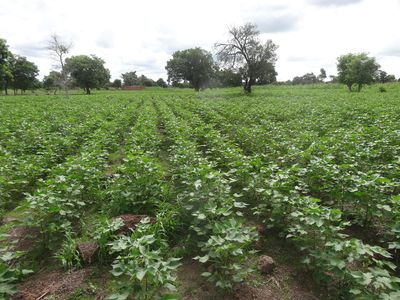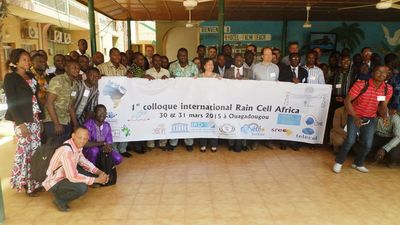Note: The call for application has been extended to January 22, 2016. Read more
WASCAL (West African Science Service Center on Climate Change and Adapted Land Use) is a large-scale research-focused Climate Service Center designed to help tackle severe challenges posed by climate change and thereby enhance the resilience of human and environmental systems to climate change and increased variability. It does so by strengthening the research infrastructure and capacity in West Africa related to climate change and by pooling the expertise of ten West African countries and Germany. Through the Graduate Studies Program WASCAL’s Capacity Building Program helps educate the next generation of scientists to attain an intimate knowledge of different climate related issues in order to help the region develop suitable management strategies.
The WASCAL Graduate Studies Program supports four Master’s and six Doctoral Programs implemented at ten lead Universities across West African countries. WASCAL provides full scholarships to the Doctoral and Master’s students in all the ten lead Universities with comprehensive training and research support. Doctoral students may spend up to six months at a host institution in Germany. The language of instruction is English. English and French language training programs are provided for all graduate students. Graduate students have access to the research facilities set up through WASCAL funding and located at various watersheds in West Africa. German partner universities collaborate with the Doctoral and Master’s Programs in the areas of curriculum development, visiting professorships and co-supervision of graduate students.
The WASCAL Graduate Studies Program offers its students:
High quality research and education on climate change and its impact on human environmental systems.
Up to six months at a host institution in Germany (Doctoral Programs only!)
Interdisciplinary working approach
International lecturers and supervisors
English language classes
Scholarship and research budget, including a personal laptop computer
Doctoral Programs
West African Climate System
Federal University of Technology, Akure (FUTA), Nigeria
Apply now: Download call for applications and application form and the recommendation letter
Climate Change and Water Resources
Université d’Abomey-Calavi (UAC), Benin
Apply now: Download call for applications and application form
Climate Change Economics
Université Cheikh Anta Diop de Dakar (UCAD), Senegal
Apply now: Download call for applications and application form
Climate Change and Biodiversity
Université Felix Houphouet Boigny (formerly Université de Cocody‐Abidjan), Côte d‘Ivoire
Apply now: Download call for applications and application form
Climate Change and Land Use
Kwame Nkrumah University of Science and Technology (KNUST), Ghana
Apply now: Download call for applications and referee form and application form
Climate Change and Agriculture
L’Institut Polytechnique Rural de Formation et de Recherche Appliquée, (IPR-IFRA), Mali and University of Cape Coast, Ghana
Apply now: Download call for applications and application form
Time Frame
The time frame of the doctoral programs is three and a half years. During the first three months, students take English and/or French language classes and common courses at the language centers. During the next 6 months student participate in lectures at their Graduate Research Program and prepare their proposals. After their proposals have been approved by their supervisors, the students conduct their field research for 12 to 24 months. For the remaining period of time, students will write up their thesis and are offered to spend up to six months at a German host institution.
Requirements
Candidates applying for a Doctoral Program must have a Master’s degree in a relevant discipline in addition to a BSc degree (second class upper division).
Citizenship in one of the WASCAL member country (Bénin, Burkina Faso, Côte d’Ivoire, The Gambia, Ghana, Niger, Mali, Nigeria, Sénegal, Togo)
Five credits including Mathematics and English Language that are also equivalent to Francophone university grading system
Gender-balanced selection decision
Applicant should show proficiency in English Language.
Meet additional requirement of the lead university
Master’s Programs
Climate Change and Human Security
University of Lomé, Togo
Apply now: Download call for applications and application form
Climate Change and Education
University of The Gambia (UTG), The Gambia
Apply now: Download application form
Climate Change and Energy
Université Abdou Moumouni de Niamey (UAM), Niger
Apply now: Download call for applications and application form
Climate Change and Adapted Land Use
Federal University of Technology, Minna, Nigeria
Apply now: Download application form
Time Frame
The time frame for the Master’s programs is two years. During the first year students participate in the course program of their Graduate Research Program and work on their research outline. Research will be conducted during the second year within a period of six to nine months. Students finish the program with writing up their thesis during the last three to six month.
Requirements
Candidates applying for Master’s Program must have a minimum BSc degree (second class upper division) in a discipline relevant to the respective program.
Citizenship in one of the WASCAL member country (Bénin, Burkina Faso, Côte d’Ivoire, The Gambia, Ghana, Niger, Mali, Nigeria, Sénegal, Togo)
Five credits including Mathematics and English Language that are also equivalent to Francophone university grading system
Gender-balanced selection decision
Applicant should show proficiency in English Language.
Meet additional requirement of the lead university
Application Process
Note: The call for application has been extended to January 22, 2016. Read more
The application process is handled jointly by WASCAL and the individual Graduate Programs. Applications can be submitted online to any of the Graduate Studies Program for the 2015/2015 season until January 8, 2016. The details of the application process can be found at the respective programs pages (see linkes above). Shortlisted candidates will be contacted and invited for interviews by January 15, 2016.
More information on the Graduate Studies Program and on open applications can be found here or at the respective universities websites.




